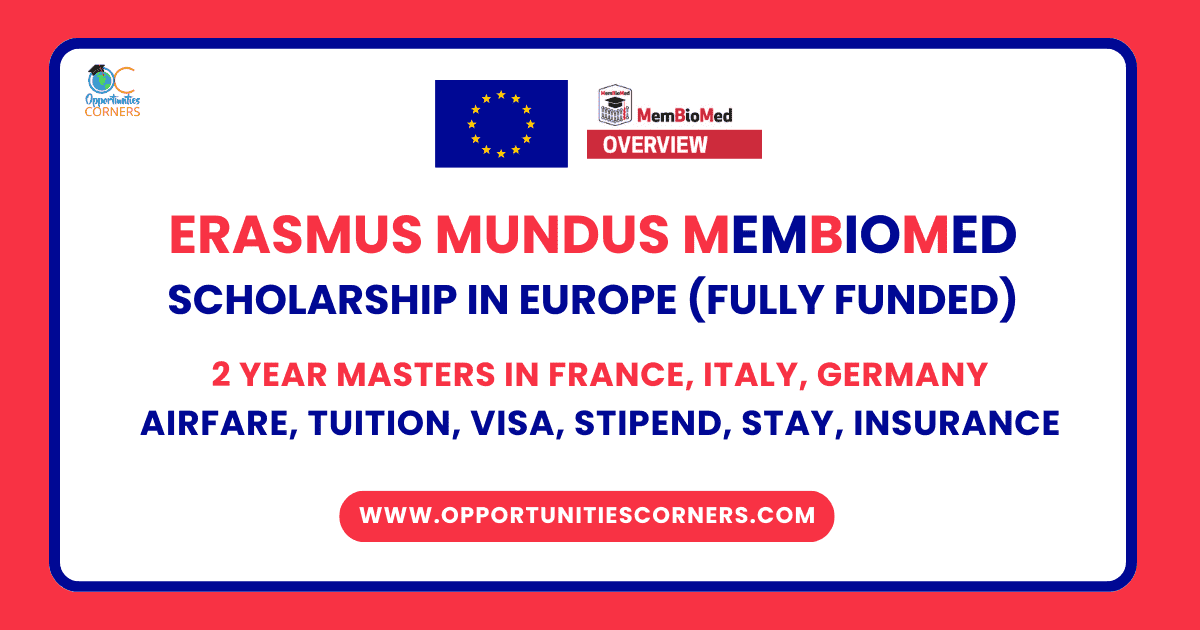Erasmus Mundus MemBioMed Scholarship 2026/28 (Fully Funded)

Erasmus Mundus MemBioMed Scholarship Opens Doors for 2026-2028 Cohort
Applications are now being accepted for the prestigious Erasmus Mundus MemBioMed Scholarship, a fully funded, two-year Master's degree program commencing in the 2026-2028 academic period. This European Union-funded initiative offers exceptional opportunities for students worldwide to study at a consortium of leading universities across France, Germany, and Italy.
A Tri-National Academic Experience
The Erasmus MemBioMed program is a collaborative effort between Université Côte d'Azur (France), the University of Genoa (Italy), and the University of Osnabrück (Germany). Successful applicants will spend their first three semesters rotating between these institutions, gaining a comprehensive understanding of the field. The final semester is dedicated to a Master's thesis, which can be completed at any of the partner universities.
Comprehensive Funding Package
The Erasmus Mundus scholarship is highly competitive and provides extensive financial support to selected students. The benefits include:
Full Tuition Fees Airfare Expenses Monthly Stipend Accommodation Assistance Food Allowance Medical Insurance Visa Costs
No Application Fee or IELTS Requirement (Potentially)
Notably, there is no application fee for the Erasmus MemBioMed Scholarship. While English proficiency is required, the IELTS requirement may be waived for applicants meeting specific criteria, making the program accessible to a broader range of international students.
Program Structure and Curriculum
The two-year Master's program is structured into four semesters:
Semester 1: Université Côte d’Azur, France Semester 2: University of Genova, Italy Semester 3: Osnabrück University, Germany Semester 4: Master’s Thesis (Any of the above universities)
The program begins on September 1st, 2026, at the Université Côte d’Azur in Nice, France.
Eligibility and Application Details
The Erasmus Mundus MemBioMed Scholarship is open to applicants of all nationalities who hold a Bachelor of Science degree in Biology or a closely related field. Prior laboratory and/or research experience is considered a significant advantage. Students in their final year of a Bachelor's program are eligible to apply, provided they can furnish proof of graduation by July 2026.
Applicants must demonstrate English proficiency through acceptable standardized tests such as TOEFL (minimum scores: 580 paper-based, 237 computer-based, 93 internet-based), IELTS (6.5), CEFR B2 level, University Language Centre certificate, or Cambridge C2 Proficiency/C1 Advanced (180/176). The English proficiency requirement is waived for candidates who have completed at least one year of secondary or university-level study in an English-language institution.
Required Documents
Applicants must submit the following documents as part of their application:
Curriculum Vitae (Europass format preferred) Cover Letter Passport scan (or national ID) Copies of certificates/degrees/diplomas (with English translations) Scan of 1st cycle degree diploma (or equivalent) Bachelor Diploma course list with descriptions and grades (with English translation) Two Recommendation Letters Evidence of English Proficiency (if applicable)
The deadline for applications is April 6th, 2025. Prospective students are strongly encouraged to review the Erasmus Mundus Joint Master's Degree scholarship requirements carefully before submitting their application.
Expert Perspective: The Importance of International Collaboration in Biomedical Education
Dr. Anya Sharma, a professor of Biomedical Engineering at the University of California, Berkeley, emphasizes the significance of programs like Erasmus Mundus MemBioMed. "In the rapidly evolving field of biomedicine, international collaboration is paramount. These programs not only provide students with access to diverse research environments and cutting-edge technologies but also foster cross-cultural understanding and collaboration, which are essential for addressing global health challenges," she states. Dr. Sharma further notes that the program’s structure, with its emphasis on mobility and exposure to different academic systems, equips graduates with a unique skillset highly valued by employers in both academia and industry.
Historical Context: The Erasmus Mundus Program and its Impact
The Erasmus Mundus program, established by the European Union, has played a crucial role in promoting international academic mobility and cooperation since its inception. Building upon the success of the original Erasmus program focused on intra-European exchange, Erasmus Mundus expanded the scope to include students and scholars from around the world. Over the years, it has facilitated the training of thousands of highly skilled professionals, contributing significantly to advancements in various fields, including biomedicine. The program reflects a broader trend towards globalization in higher education, recognizing the benefits of diverse perspectives and collaborative research efforts.
Analyst Viewpoint: A Strategic Investment in Future Biomedical Leaders
According to education policy analyst, Ben Carter, the Erasmus Mundus MemBioMed program represents a strategic investment in the development of future biomedical leaders. "By providing comprehensive financial support and access to world-class research facilities, the program empowers talented individuals to pursue advanced studies and contribute to groundbreaking discoveries," Carter explains. He also highlights the program's potential to address critical skills gaps in the biomedical sector and foster innovation in areas such as drug development, diagnostics, and personalized medicine.
Application Link
For detailed information and the application portal, please visit the official program website: (Source: https://life.univ-cotedazur.eu/international/membiomed/course-outline)
Originally sourced from: Opportunities Corners
